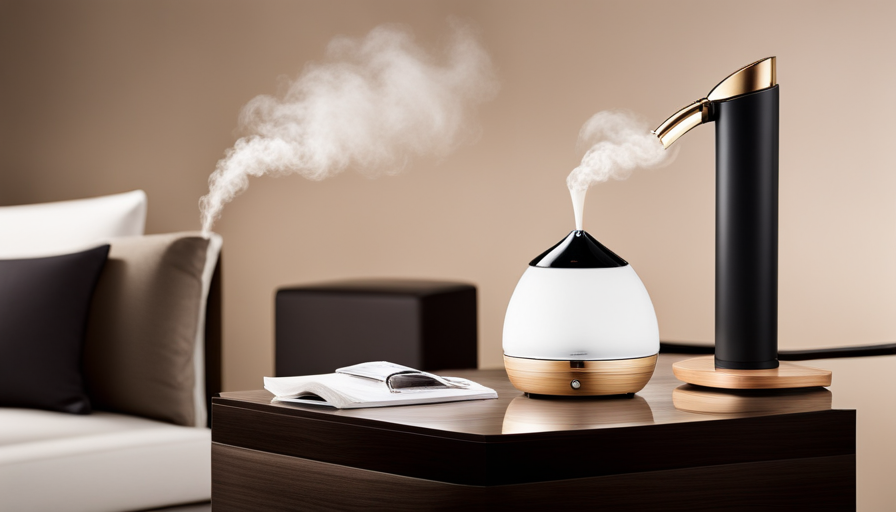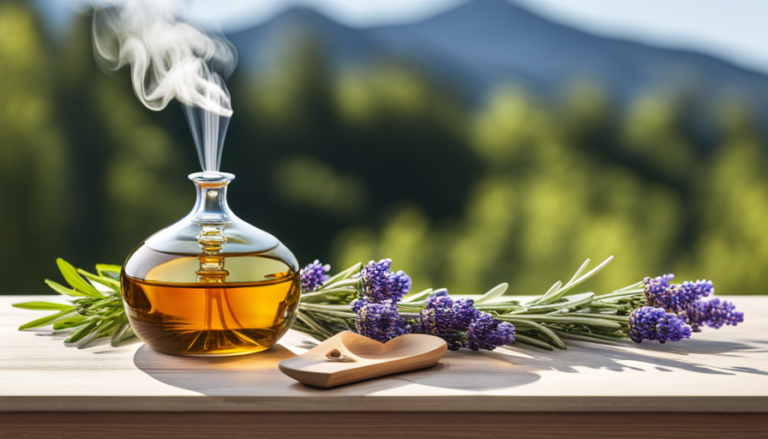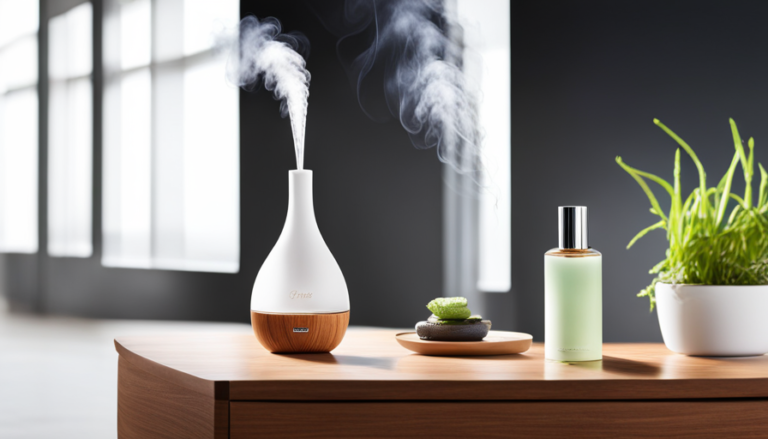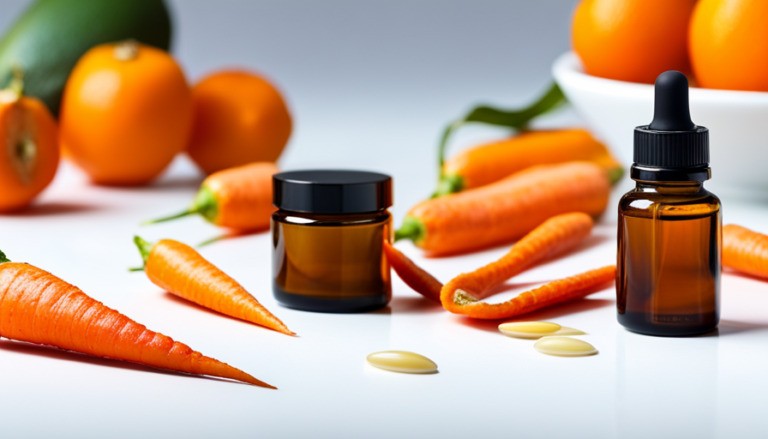Oil Diffuser Vs Humidifier

Are you struggling to decide between an oil diffuser and a humidifier? Let’s embark on a journey of exploration, comparing these two devices to help you make an informed decision.
In this article, we will delve into the functions, differences in operation and technology, and maintenance tips for both options. By the end, you’ll have all the evidence-based information you need to choose the device that suits your needs best.
So let’s dive in and unravel the mysteries of oil diffusers versus humidifiers!
Key Takeaways
- Oil diffusers disperse essential oils into the air, creating a soothing and aromatic environment, while humidifiers add moisture to the air, alleviating dryness on surfaces and skin.
- Oil diffusers promote relaxation, stress relief, and improve sleep quality and focus, while humidifiers benefit individuals with respiratory issues or dry skin and improve indoor air quality.
- Oil diffusers use heat, evaporation, or ultrasonic vibrations to disperse oils, while humidifiers increase humidity levels through evaporation, ultrasonic nebulization, or wick filtration.
- Maintenance and care tips include cleaning and refilling oil diffusers regularly, using high-quality essential oils, and cleaning humidifiers to prevent mold or bacteria buildup and replacing filters for efficient operation.
Function and Purpose of an Oil Diffuser
If you want to add a pleasant fragrance to your space, an oil diffuser is perfect for you. Oil diffusers are designed to disperse essential oils into the air, creating a soothing and aromatic environment.
Through the process of aromatherapy, these devices provide numerous benefits for both physical and mental well-being. Different essential oils offer various therapeutic properties such as relaxation, stress relief, improved sleep quality, and enhanced focus.
Lavender oil, for example, is known for its calming effects and can promote better sleep. Peppermint oil has been shown to increase alertness and boost energy levels. With a wide range of essential oil options available in the market today, you can choose the ones that suit your needs or preferences.
Now let’s delve into the function and purpose of a humidifier without further delay.
Function and Purpose of a Humidifier
The function and purpose of a humidifier is to add moisture to the air, which can have several benefits for indoor air quality. By increasing humidity levels, a humidifier helps to alleviate dryness in the air and on surfaces, such as skin, lips, and furniture. This can be particularly beneficial during winter months when heating systems tend to dry out the air. Additionally, using a humidifier can help reduce symptoms related to dry air, such as dry throat, coughing, and congestion. Moreover, maintaining optimal humidity levels in your home can also prevent the growth of mold and bacteria. A humidifier achieves this by releasing water vapor into the air through various mechanisms like evaporative or ultrasonic technologies.
Transitioning into the subsequent section about ‘differences in operation and technology,’ it’s important to understand how these functions compare to those of an oil diffuser.
Differences in Operation and Technology
One key distinction between oil diffusers and humidifiers is how they operate and the technology they utilize. Understanding these differences can help you choose the right device for your needs.
-
Operation techniques: Oil diffusers work by dispersing essential oils into the air using heat, evaporation, or ultrasonic vibrations. Humidifiers, on the other hand, increase humidity levels by releasing moisture into the air through various mechanisms such as evaporation, ultrasonic nebulization, or wick filtration.
-
Technological advancements: Both oil diffusers and humidifiers have seen technological advancements over time. For instance, some modern oil diffusers feature advanced timers and settings to control fragrance intensity and diffusion patterns. Humidifiers have also evolved with features like adjustable mist output levels and built-in hygrometers to monitor humidity levels.
Understanding how these devices operate and their technological advancements can help you make an informed choice when deciding which one suits your needs best.
In the next section, we will explore factors to consider in choosing the right device for your specific requirements.
Choosing the Right Device for Your Needs
When selecting the ideal device for your needs, it is crucial to consider factors such as functionality and desired outcomes.
Both oil diffusers and humidifiers have their own set of pros and cons.
Oil diffusers are specifically designed to disperse essential oils into the air, creating a pleasant aroma that can promote relaxation and improve mood.
On the other hand, humidifiers increase moisture levels in the air, which can be beneficial for individuals with respiratory issues or dry skin.
While both devices offer health benefits, it’s important to note that oil diffusers may not provide the same level of relief for respiratory conditions as humidifiers do.
Therefore, if you are primarily seeking respiratory support or relief from dryness, a humidifier may be the better choice for you.
Moving on to maintenance and care tips…
Maintenance and Care Tips
To properly maintain and care for your oil diffuser, it is important to regularly clean and refill it.
Cleaning an oil diffuser involves:
- Emptying any remaining water and essential oils.
- Wiping down the interior with a soft cloth.
- Using a mild detergent or vinegar solution to remove any residue.
Refilling the diffuser requires:
- Adding water up to the fill line.
- Adding a few drops of your chosen essential oil.
Similarly, maintaining a humidifier involves regular cleaning to prevent mold or bacteria buildup.
This can be done by:
- Emptying and rinsing out the tank daily.
- Disinfecting it weekly with a mixture of water and hydrogen peroxide.
- Replacing the filter as recommended by the manufacturer.
Cleaning and Refilling an Oil Diffuser
Start by cleaning and refilling your oil diffuser regularly to ensure optimal performance. Here are three key steps to help you maintain your oil diffuser:
-
Cleaning techniques: To clean your oil diffuser, start by emptying any remaining water and oils from the tank. Use a soft cloth or cotton swab soaked in rubbing alcohol to wipe down the inside of the tank, removing any residue or buildup. Be sure to clean the ultrasonic disc as well, as this can also accumulate oils over time.
-
Types of essential oils to use: When refilling your oil diffuser, it is important to choose high-quality essential oils that are specifically designed for use in diffusers. These oils should be pure and free from additives or synthetic fragrances.
-
Refilling process: Fill the tank with clean water until it reaches the fill line indicated on the device. Add a few drops of your chosen essential oil(s) into the water according to the manufacturer’s instructions. Avoid overfilling the tank to prevent leaks or malfunctions.
Now that you know how to properly care for your oil diffuser, let’s explore how to clean and maintain a humidifier without compromising its performance.
Cleaning and Maintaining a Humidifier
Regular cleaning and maintenance is essential for keeping a humidifier in optimal condition. To ensure its proper function, it is recommended to clean your humidifier at least once a week. However, if you notice any signs of mold or mildew, more frequent cleaning may be necessary.
When cleaning your humidifier, it is important to use common cleaning solutions such as vinegar or bleach diluted with water. These solutions effectively remove mineral deposits and kill any bacteria or fungi that may have accumulated inside the humidifier. Be sure to follow the manufacturer’s instructions when disassembling and cleaning different components of your humidifier.
Regularly replacing the filter will also help maintain a clean and efficient machine. By following these guidelines, you can ensure that your humidifier provides clean and healthy air for you and your family to breathe in.
Conclusion
In conclusion, when it comes to choosing between an oil diffuser and a humidifier, it ultimately depends on your specific needs.
Both devices serve different purposes. The oil diffuser helps create a soothing environment with aromatic scents, while the humidifier adds moisture to the air for improved respiratory health.
Consider factors such as room size, desired effects, and maintenance requirements before making your decision.
Remember, like two branches on a tree, these devices may appear similar but have distinct functions that cater to different preferences.






